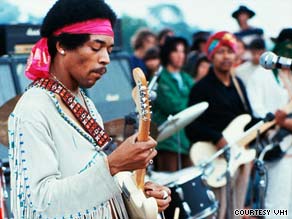My new e-book about my encounters with one of the youth "icons" of that day, Kurt Vonnegut, was just published yesterday, so let's relate how he sized up the festival about twenty years later in a PBS panel. Note: He doesn't mention it, but one of the infamous incidents that weekend featured Peter Townsend of The Who smacking Abbie Hoffman with his guitar when Abbie got up on stage to make a political statement.
BEN WATTENBERG: Kurt Vonnegut, you were one of the cultural icons at that time -- like it or not.Morris Dickstein, author of The Gates of Eden, responded that Woodstock "didn't really represent all of the '60s. It represented those strands of the counter-culture rather than the political side of the '60s, but it had its own politics because it took place in the context of the war, so all those days of peace and love amid chaos and disorganization really was a way of acting out a kind of lifestyle protest against the wars, assassinations and the whole violent side of the '60s that tends to get stressed more in media stereotypes."
VONNEGUT: I never showed myself to my people. [Laughter.]
I had four kids who were the proper age to go to Woodstock, and they simply were not interested, although they were pacifists and outraged at the government and so forth. They were attracted to peace marches, to sit-ins, to teach-ins and political demonstrations.
And we were talking just in the Green Room about how much I miss Abbie Hoffman. He was a great man, he was a useful man for focusing attention on the outrages, many outrages, many injustices and nuttinesses in our society. And Woodstock did none of that, I guess. As you said, it was politically useless....Well, an important movement was going on in the universities, in the coffee houses, among intelligent people prepared to do political work. And so concerts really had nothing to do with it.
But it seems after the fact, an awful lot of important, devoted thinking has come out of the '60s relative to rescuing the planet, to questioning authority on military adventures, and so forth.
But Dickstein added: "Woodstock represented a failed utopianism that very easily got commercialized and I think very easily got turned into style. You know, what happened -- I mean the people who were in their own way protesting the war and other things at Woodstock were acting out a criticism not by going to the ballot box, but by the way they dressed, the clothes they wore, various kinds of mores that got the label 'lifestyle' later on. And the counterculture -- unlike the New Left, the counterculture was very amenable to being turned into something that could easily be commercialized.
But Jim Miller, who has written histories of the Left as well as reviewed records for Rolling Stone, replied: "I think I really disagree with you. I think actually Iwould put it almost the other way around, that the New Left, which I've written a book about, I think ultimately isn't that important politically, and it didn't have that great an impact, except indirectly by sparking a middle class peace movement.
"The counter-culture, precisely because it was picked up and shoved into the marketplace, spread the ethos of the '60s in the early '70s, and in the process of what you're, I think, denigrating as style or fashion, actually changed the culture and changed it. It changed sexual mores, it changed attitudes towards authority, it changed a sense of what was permissible to experiment with, what limits could be toyed with. What drove them home in American culture was the marketing through rock and roll, among other things, through film, of a certain fantasy of freedom that to me has connections, say, with early progressive Bohemians. But it becomes a mass artifact."
For more on my new e-book, Vonnegut and Me, go here.

No comments:
Post a Comment